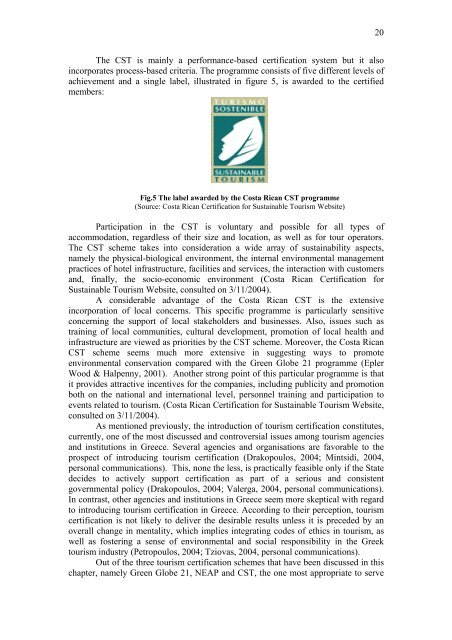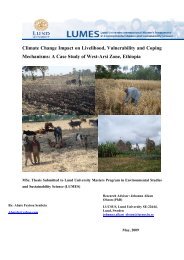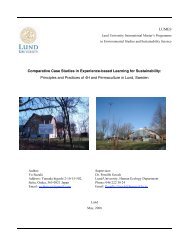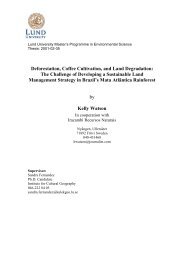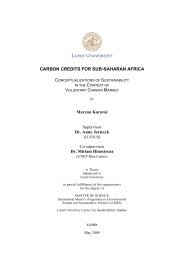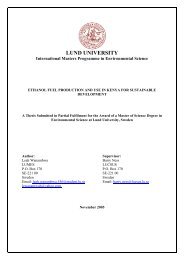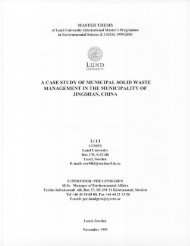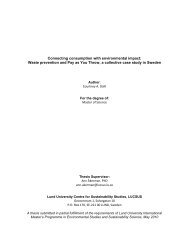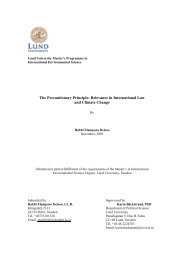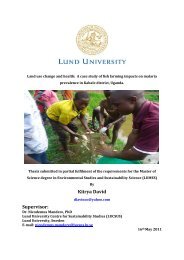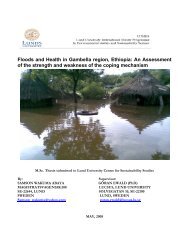Thesis title: âThe development of community-based ecotourism - lumes
Thesis title: âThe development of community-based ecotourism - lumes
Thesis title: âThe development of community-based ecotourism - lumes
You also want an ePaper? Increase the reach of your titles
YUMPU automatically turns print PDFs into web optimized ePapers that Google loves.
20The CST is mainly a performance-<strong>based</strong> certification system but it alsoincorporates process-<strong>based</strong> criteria. The programme consists <strong>of</strong> five different levels <strong>of</strong>achievement and a single label, illustrated in figure 5, is awarded to the certifiedmembers:Fig.5 The label awarded by the Costa Rican CST programme(Source: Costa Rican Certification for Sustainable Tourism Website)Participation in the CST is voluntary and possible for all types <strong>of</strong>accommodation, regardless <strong>of</strong> their size and location, as well as for tour operators.The CST scheme takes into consideration a wide array <strong>of</strong> sustainability aspects,namely the physical-biological environment, the internal environmental managementpractices <strong>of</strong> hotel infrastructure, facilities and services, the interaction with customersand, finally, the socio-economic environment (Costa Rican Certification forSustainable Tourism Website, consulted on 3/11/2004).A considerable advantage <strong>of</strong> the Costa Rican CST is the extensiveincorporation <strong>of</strong> local concerns. This specific programme is particularly sensitiveconcerning the support <strong>of</strong> local stakeholders and businesses. Also, issues such astraining <strong>of</strong> local communities, cultural <strong>development</strong>, promotion <strong>of</strong> local health andinfrastructure are viewed as priorities by the CST scheme. Moreover, the Costa RicanCST scheme seems much more extensive in suggesting ways to promoteenvironmental conservation compared with the Green Globe 21 programme (EplerWood & Halpenny, 2001). Another strong point <strong>of</strong> this particular programme is thatit provides attractive incentives for the companies, including publicity and promotionboth on the national and international level, personnel training and participation toevents related to tourism. (Costa Rican Certification for Sustainable Tourism Website,consulted on 3/11/2004).As mentioned previously, the introduction <strong>of</strong> tourism certification constitutes,currently, one <strong>of</strong> the most discussed and controversial issues among tourism agenciesand institutions in Greece. Several agencies and organisations are favorable to theprospect <strong>of</strong> introducing tourism certification (Drakopoulos, 2004; Mintsidi, 2004,personal communications). This, none the less, is practically feasible only if the Statedecides to actively support certification as part <strong>of</strong> a serious and consistentgovernmental policy (Drakopoulos, 2004; Valerga, 2004, personal communications).In contrast, other agencies and institutions in Greece seem more skeptical with regardto introducing tourism certification in Greece. According to their perception, tourismcertification is not likely to deliver the desirable results unless it is preceded by anoverall change in mentality, which implies integrating codes <strong>of</strong> ethics in tourism, aswell as fostering a sense <strong>of</strong> environmental and social responsibility in the Greektourism industry (Petropoulos, 2004; Tziovas, 2004, personal communications).Out <strong>of</strong> the three tourism certification schemes that have been discussed in thischapter, namely Green Globe 21, NEAP and CST, the one most appropriate to serve


